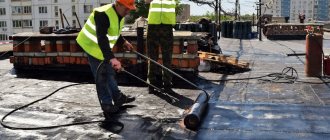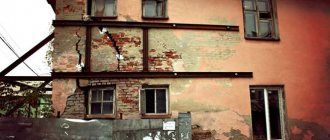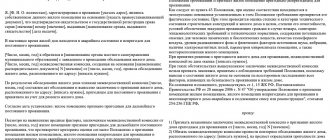What is an “emergency” residential building?
At present, neither the Housing Code of the Russian Federation (LC RF), nor the Regulations “On recognizing premises as residential premises, residential premises unsuitable for habitation, an apartment building in disrepair and subject to demolition or reconstruction, a garden house as a residential building and a residential building as a garden house”, approved (Resolution No. 47) does not provide a clear definition of “emergency residential building”.
At the same time, the said Resolution quite thoroughly defines the grounds for recognizing a residential building as unsafe and subject to demolition or reconstruction.
Therefore, the grounds contained in this regulatory act are applied, including when deciding the issue of recognizing an apartment building in operation as unsafe and subject to demolition.
According to Resolution No. 47, recognition of a residential building as unsafe is possible if:
- its wear is over 70%;
- its sanitary condition does not meet the requirements established in Resolution No. 47;
More detailsThe following cannot serve as a basis for declaring a residential premises unfit for habitation:
lack of a centralized sewerage system and hot water supply in one- and two-story residential buildings;
- the absence in a residential building of more than 5 floors of an elevator and a garbage chute, if this residential building, due to physical wear and tear, is in a limited working condition and is not subject to major repairs and reconstruction;
- inconsistency of the space-planning solution of residential premises and their location with the minimum area of rooms and auxiliary premises of the apartment in an operating residential building, designed and built according to previously valid regulatory documentation, with currently adopted space-planning decisions, if this solution satisfies the ergonomic requirements regarding the placement of the necessary a set of furniture and functional equipment (clause 41 of Resolution No. 47).
In addition, a building is considered subject to demolition if it is technically impossible to correct existing deficiencies. For example, in such a state of the building’s load-bearing structures, when due to their natural wear and tear or external influences they have excessive deformations and damage, have lost their design strength and pose a danger to residents.
More details
Along with the concept of “dilapidated house”, the concept of “dilapidated housing” is used in many regional and municipal programs, judicial acts, as well as in everyday speech. Meanwhile, neither the Housing Code of the Russian Federation nor Resolution No. 47 mentions it and, accordingly, does not define it.
Analysis of law enforcement practice allows us to formulate the concept of the dilapidated state of a building as a condition in which the building structure and the building as a whole are worn out:
- for stone houses - over 70%;
- wooden houses - over 65%;
- houses with walls made of local materials – over 65%;
- attics - over 65%.
At the same time, the main load-bearing structures of the building retain strength sufficient to ensure the stability of the building, however, the building itself ceases to meet the specified operational requirements (including “Methodological recommendations for protecting the rights of participants in the reconstruction of residential buildings of various forms of ownership” (approved), Order of Rosstat dated August 15, 2016 No. 427 “On approval of statistical tools for organizing federal statistical monitoring of construction, investments in non-financial assets...”).
Thus, dilapidated housing is characterized by a high degree of wear and tear of its structures without the danger of their collapse and, accordingly, does not pose a danger to life, and emergency housing has deformations and damage to the load-bearing structures, so that living in this residential premises is life-threatening due to the real possibility of collapse.
Is it worth trying to repair the building yourself if it’s not being done?
At their own expense, residents can upgrade and improve their apartment, but if the structure as a whole needs a number of specific operations, you should not try to fix the problems yourself.
The management company is responsible for providing you with adequate living conditions, and in case of any problems, it bears full responsibility for eliminating any problems regarding the entire structure as a whole and the living comfort of its residents. According to the resolution of the State Committee for Construction and Residential Complex dated September 27, 2003 No. 170, the management company must modernize houses once every 3-5 years .
Thus, every tenant should not ignore the fact that his house is in disrepair, and even if the management company is not going to do anything, you should not try to improve the entire house yourself.
You need to be aware of the cases in which housing is considered unsafe, as well as how to maintain it in order. The resident of the house must understand what services he is obliged to pay for and which are covered by the management company. It is worth remembering that first of all you should think about your safety.
Regional targeted program for the resettlement of citizens from emergency housing stock
The goal of ensuring a sustainable reduction in the uninhabitable housing stock was set for authorities at all levels back in 2008. However, since today it remains unachieved, its achievement was extended by Decree of the President of the Russian Federation dated May 7, 2017 No. 204.
Currently, the achievement of this goal is planned within the framework of the national project “Housing and the Urban Environment,” which includes, among other things, the federal project for the resettlement of emergency housing “Ensuring a sustainable reduction of unsuitable housing stock.”
It is expected that, based on the successful experience of implementing similar programs in 2013-2017, the parameters for recognizing a residential building as unsafe will be clarified, permanent mechanisms for resettling emergency housing stock will be formed, including by providing the regions with an expanded set of tools, such as: purchase of housing, exchange, subsidies for the acquisition, development of built-up areas, rental houses.
This program for resettlement from dilapidated houses is being implemented by the federal government jointly with regional and municipal authorities in accordance with Federal Law No. 185-FZ dated July 21, 2007 “On the Fund for Assistance to the Reform of Housing and Communal Services.”
According to the norms of this law, a regional targeted program for the resettlement of citizens from emergency housing stock is approved by the executive authorities of the constituent entity of the Russian Federation.
More details
After January 1, 2021, these programs are approved for the period until September 1, 2025.
Regional authorities compile a list of apartment buildings that are recognized in accordance with the established procedure as unsafe and subject to demolition or reconstruction due to physical wear and tear during their operation.
More details
Information on the inclusion of a residential building in the register of emergency buildings is available for review on the official website of the State Corporation - Fund for Assistance to the Reform of Housing and Communal Services www.reformagkh.ru and the Ministry of Construction and Housing and Communal Services of the Russian Federation www.minstroyrf.ru.
The fact of the presence of one or another sign of emergency is not a sufficient basis for the conclusion that a residential building is unsuitable for habitation. The decision to recognize a residential building as unsafe and subject to demolition or reconstruction, in any case, is made in accordance with the established procedure.
The procedure for recognizing a residential building as unsafe
Current legislation provides for a special procedure for declaring residential premises unfit for habitation.
According to Resolution No. 47, the recognition of an apartment building as unsafe and subject to demolition or reconstruction is carried out by an interdepartmental commission specially created for these purposes.
Moreover, the solution to this issue is the exclusive competence of this commission and is not within the powers of even the judicial authorities.
More details
You can appeal to the judicial authorities only the decisions of the specified interdepartmental commissions on issues related to the recognition of a residential premises as suitable (unsuitable) for living and an apartment building as unsafe and subject to demolition, or the inaction of the authorities in making these decisions.
The basis for starting the work of the interdepartmental commission may be:
- statement from the owner of the premises;
- application from a citizen (employer);
- conclusion of bodies authorized to conduct state control and supervision on issues within their competence (clause 42 of Resolution No. 47).
Based on the results of consideration of the above application, the commission makes one of the following decisions:
- on identifying the grounds for recognizing an apartment building (AMD) as unsafe and subject to reconstruction;
- on identifying the grounds for recognizing the apartment building as unsafe and subject to demolition;
- about the absence of grounds for recognizing the apartment building as unsafe and subject to demolition or reconstruction.
Based on the received conclusion of the commission on identifying the grounds for recognizing the apartment building as emergency, local government bodies
within 30 days, they make a decision to recognize the apartment building as unsafe and subject to demolition or reconstruction and issue an order indicating the methods of further use of the premises and the timing of the resettlement of citizens.
The owners of residential premises in an emergency apartment building are sent a notice of the decision made to confiscate their residential premises, as well as a draft agreement on the confiscation of real estate
for state or municipal needs in the manner and within the time limits established by law (Part 4 of Article 32 of the Housing Code of the Russian Federation).
If the owner has not entered into an agreement on the seizure of real estate for state or municipal needs, including due to disagreement with the decision to seize residential premises from him, a state authority or local government body
who have made such a decision can file a claim in court for the forced seizure of residential premises (Part 9 of Article 32 of the Housing Code of the Russian Federation).
Forced seizure of residential premises on the basis of a court decision is possible only subject to preliminary and equivalent compensation. At the same time, at the request of the previous owner of the residential premises, he retains the right to use this premises, if he does not own other residential premises, for a period of no more than 6 months after the provision of compensation to him, unless otherwise established by an agreement with him (Part 1). 6, Article 32 of the Housing Code of the Russian Federation).
More details
The owner of a residential premises subject to seizure, prior to the conclusion of an agreement on the seizure of real estate for state or municipal needs or the entry into force of a court decision on the forced seizure of such real estate, may own, use and dispose of it at his own discretion and make the necessary expenses to ensure the use of the residential property. premises in accordance with its purpose (part 5 of article 32 of the Housing Code of the Russian Federation).
Arbitrage practice:
Established judicial practice indicates that the established procedure is also applicable in relation to private residential buildings owned by citizens by right of ownership, since the legislator does not provide for any other procedure for inspecting private residential buildings in order to recognize them as suitable or unsuitable for citizens to live in (Review of judicial practice, approved Presidium of the Supreme Court of the Russian Federation dated April 29, 2014).
Of significant importance for the exercise of rights when recognizing a residential building as unsafe and subject to demolition is the fact whether the person is the owner of the residential premises in it or uses the premises under a social tenancy agreement.
What can residents of a dilapidated building not pay for?
If you are “lucky enough” to be a resident of a dilapidated building, then you should know what you are and are not obliged to pay for, according to paragraph 2.3.7 of the resolution of the State Construction Committee of the Russian Federation dated September 27, 2003 No. 170:
- Major repairs are not included in the list of services for which you should pay, since this is carried out by the management company, which is also responsible for the procedure for relocating residents in a dilapidated building (what is the timeframe for resettlement?).
- You are financially responsible for the maintenance and repair of your specific home, and providing the apartment with standard living conditions means that you continue to pay the bills that you personally use.
Rights of owners of residential premises when a residential building is recognized as unsafe:
4.1. Rights of owners of residential premises during the resettlement of emergency houses
The rights of citizens who own apartments when a residential building is recognized as unsafe depend on the grounds for eviction.
Current legislation distinguishes two grounds for the resettlement of citizens from emergency housing:
- resettlement of citizens when a residential building is not included in the regional targeted program for the resettlement of citizens, but a decision has been made to seize the land plot
on which the residential building is located for state or municipal needs; - recognition of a residential building as unsafe and its inclusion in a regional targeted program for the relocation of citizens from emergency housing stock.
In the first case, when MKD
, recognized as emergency and subject to demolition, is not included in the program for the resettlement of citizens from emergency housing stock, the rights of the owner of the residential premises are ensured in the manner prescribed by Art. 32 Housing Code of the Russian Federation.
According to this article, the owner can only count on payment of the redemption price of the seized residential premises. At the same time, state authorities or local self-government
are not obliged to provide the owner of the seized residential premises with other residential premises.
In this case, another residential premises instead of the seized one can be provided to the owner only if there is an appropriate agreement reached with the local government body, and only with the offset of its value when determining the amount of compensation for the seized residential premises (Part 8 of Article 32 of the Housing Code of the Russian Federation; clause 20 Resolution of the Plenum of the Supreme Court of the Russian Federation dated July 2, 2009 No. 14).
In the second case, when an apartment building is included in a regional targeted program for the resettlement of citizens from emergency housing stock, the owners of residential premises have the right to count not only on the repurchase of the seized residential premises, but also on the provision of other residential premises in return.
Moreover, the choice of any of the above methods remains with the owner of the residential premises (Clause 3, Article 2, Article 16 of Law No. 185-FZ dated July 21, 2007; Section 2 of the Review of Judicial Practice, approved by the Presidium of the Supreme Court of the Russian Federation dated April 29, 2014).
The exception is the owners who purchased residential premises after the apartment building was declared unsafe.
Citizens who have acquired ownership of residential premises in an apartment building after it was recognized in the established manner as unsafe and subject to demolition or reconstruction, with the exception of citizens whose ownership of such residential premises arose by inheritance, have the right only to payment of compensation for seized residential premises. In this case, the amount of compensation cannot exceed the cost of acquiring such residential premises.
4.2. Rights of owners of non-residential premises in an unsafe apartment building
Legal consequences of recognition of ICD
emergency and subject to demolition or reconstruction for owners of non-residential premises in apartment buildings are not directly regulated by law.
However, in paragraph 1 of Art. 239 of the Civil Code of the Russian Federation provides that in cases where the seizure of a land plot for state or municipal needs is impossible without termination of ownership of buildings, structures or other real estate located on this site, this property can be seized from the owner through redemption by the state or sale from public auctions in the manner prescribed by the Civil Code of the Russian Federation.
The above rule connects the possibility of compensation for the value of real estate to its owners with the termination of ownership of real estate when a land plot is withdrawn for state or municipal needs
, on which it is located.
This position is confirmed by existing judicial practice. (Decision of the Supreme Court of the Russian Federation dated July 3, 2018 No. 309-KG17-23598 in case No. A50-23011/2016).
4.3. Redemption price, procedure for determining it and other expenses of the owner subject to reimbursement
The redemption price of the seized residential premises is determined according to the rules established by Part 7 of Art. 32 Housing Code of the Russian Federation.
In this case, the amount of compensation for seized residential premises includes:
- market value of residential premises;
- the market value of common property in an apartment building, taking into account its share in the right of common ownership of such property;
- losses caused to the owner by its seizure, including lost profits, as well as the amount of compensation for major repairs not carried out (part 7 of article 32 of the RF Housing Code; section 2 Review of judicial practice, approved by the Presidium of the Supreme Court of the Russian Federation on April 29, 2014).
In any case, the amount of compensation for residential premises, terms and other conditions of seizure are determined by agreement with the owner of the residential premises (Part 6, Article 32 of the Housing Code of the Russian Federation).
Other expenses associated with relocation from a dilapidated house and the owner moving to a new apartment (costs of transportation, apartment selection agency services, costs of paperwork for the purchase and sale of other housing) are usually borne by the citizen making the move. However, in private cases, compensation for expenses incurred (in whole or in part) by municipal authorities is possible. As a rule, such compensation can only be obtained through legal action.
Rights of tenants of residential premises when a house is recognized as unsafe:
5.1. Rights of tenants of residential premises when relocating a dilapidated house
In cases where the person living in the apartment is a social tenant (i.e. the apartment in which the citizen lives is owned by the state), the process of relocation from a dilapidated building or housing subject to demolition occurs according to a simplified scheme: social tenancy agreement for another premises.
In this case, the other residential premises provided must be:
- comfortable (i.e., regardless of the presence of communications in the old house, the new one must have water, plumbing and central heating);
- equivalent in total area to the previously occupied residential premises;
- the requirements
established for residential premises ; - located within the boundaries of a given locality. (Part 1 of Article 89 of the RF Housing Code; Clause 59 of the Review of Judicial Practice of the Supreme Court of the Russian Federation No. 3 (2018), approved by the Presidium of the Supreme Court of the Russian Federation on November 14, 2018).
More details
The provided residential premises may be located within the boundaries of another locality of the subject of the Russian Federation, on the territory of which the previously occupied residential premises are located, only with the written consent of the resettled citizens.
At the same time, refusals of citizens from the residential premises provided to them within the boundaries of another settlement, including repeated ones, cannot be grounds for refusal to provide them with other residential premises for the purpose of relocation from emergency housing within the boundaries of the settlement at the place of their residence or within the boundaries another populated area of a constituent entity of the Russian Federation, on the territory of which the previously occupied residential premises are located (Part 3 of Article 16 of Law No. 185-FZ of July 21, 2007).
If the rental object is a room in a communal apartment located in a house declared unfit for habitation and subject to demolition, then when determining the total area of another residential premises provided in connection with the eviction, the following is taken into account:
- the total area of the room as part of a communal apartment, including the living area of the room itself and the area of auxiliary premises that may be located next to such a room and used exclusively for servicing this room (for example, a storage room);
- as well as the share of the area of auxiliary premises of the entire communal apartment as a whole (kitchen, toilet, bathroom, etc.) used to service more than one room.
Arbitrage practice:
When providing housing, the presence of other residential premises owned by the tenant or his family members is not taken into account (Section 3 of the Review of Judicial Practice, approved by the Presidium of the Supreme Court of the Russian Federation on April 29, 2014).
If tenants were on the waiting list to improve their living conditions, when moving from a dilapidated building, the waiting list remains behind them, regardless of what housing conditions they will be moved to.
If the tenant refuses to move to the provided residential premises, the local government authority
has the right to apply to the court with a corresponding claim.
5.2. Common misconceptions of residential tenants when moving from emergency housing
Very often, citizens living in residential buildings recognized as unsafe are mistaken in their expectations regarding the conditions of relocation and the parameters of the apartments to be provided.
Therefore, we consider it necessary to understand the most popular misconceptions regarding this issue.
1st misconception:
If you register as many people as possible in housing, then the area will be provided based on the established norm of living space per person.
According to the norms of current legislation, the residential premises provided must be equivalent in total area to the previously occupied residential premises.
The only exception to this case can be if people are registered as needy.
However, they must not, within the time established by law, intentionally perform any actions that lead to a deterioration in their living conditions.
But in a number of cases, even being registered as those in need of residential premises does not give the right to receive a larger residential premises.
Providing housing with a larger area when moving from a dilapidated house is a right, and not an obligation, of the local government and depends on the appropriate financial opportunity provided for by the local budget.
2nd misconception:
If two families are registered in the housing, then you can get two apartments.
Many are convinced that when providing an apartment, the number of families living in the apartment will be taken into account.
In fact, people living in an apartment under a social lease agreement can only count on one apartment, which will be identical in square footage to the previous housing.
3-misconception:
You can choose an apartment many times until the municipality offers the ideal option.
In fact, the municipal authorities will offer a limited number of options, and if the tenants do not agree with the move, the municipality will go to court to force eviction.
Can I request relocation?
What to do if there are no major repairs, but they don’t want to recognize the housing as unsafe? Based on the Decree of the Government of the Russian Federation dated January 28, 2006 No. 47, you have every right to demand from the management company major repairs or relocation in cases where:
- Deformations were noticed on the load-bearing structures.
- There are some missing elements of utilities, such as centralized heating or problems with water supply.
- The air temperature in the rooms is less than 18 degrees for a long period of time.
- Air humidity more than 60%.
- Lack of a certain number of windows and doors.
- The presence of toxic substances, especially in large quantities.
ATTENTION . If at least one of the above points is observed in your home, you can expect certain actions from the management company to improve your living conditions.
If she does not want to recognize the house as unsafe, you have the right to write a collective complaint against the management company and contact higher authorities.
The conditions under which residents of a dilapidated building can demand relocation are described here.
We invite you to read useful publications about:
- what compensation can you expect if the house is considered dilapidated or in disrepair;
- how to buy emergency real estate.
Demolition of an unsafe residential building - whose responsibility?
According to paragraph 10 of Art. 32 of the Housing Code of the Russian Federation, if an apartment building is recognized as unsafe and subject to demolition or reconstruction, the body that made such a decision may require the owners of the premises in this house to demolish or reconstruct the house.
In practice, owners of residential premises, as a rule, do not demolish apartment buildings at their own expense due to the high cost of this activity.
If the owners do not fulfill the demand within the established period, the land plot on which the house is located, and, accordingly, each room in this house is subject to seizure for municipal needs.
The corresponding decision must be sent to Rosreestr for entering information about the seizure into the Unified State Register of Real Estate (USRN)
.
More details
A special procedure has been established for the demolition of unsafe residential buildings located within the boundaries of a built-up area in respect of which a decision has been made on development in the manner established by urban planning legislation.
In this case, the body that made the decision to recognize such a house as unsafe is obliged to:
- present a demand to the owners of the premises in the specified house for its demolition or reconstruction;
- set a period of at least 6 months for filing an application for a permit for the construction, demolition or reconstruction of the specified house.
If the owner or owners of the apartment building do not submit an application for permission to build, demolish or reconstruct such a house within the established period, the land plot on which the said house is located and the residential premises in the said house are also subject to seizure for municipal needs (clause 11 of article 32 of the Housing Code of the Russian Federation).
Moreover, withdrawal of the land plot in this case before the expiration of the established period is allowed only with the consent of the owner (Clause 12, Article 32 of the Housing Code of the Russian Federation).
The procedure for termination of rights in the Unified State Register of Real Estate (USRN)
Ownership of an apartment located in a dilapidated building is terminated in the Unified State Register of Real
based on one of the following documents:
- agreement with the owner of the residential premises on the provision of another residential premises or compensation for the seized apartment (in this case contact Rosreestr
the owner must submit an application for the transfer of rights and the municipality must submit an application for registration of the right; state duty is not paid in this case);
- a judicial act on the seizure of residential premises and termination of ownership rights that has entered into legal force (in this case, municipal authorities have the right to apply to Rosreestr unilaterally).
You may need help with documents. In this case, we recommend using the help of our specialists
!
You may also be interested in:
Demolished or destroyed property: how to properly register it?
State support measures for the purchase of housing
Powers of the commission
When submitting an application, you should clearly understand what to expect from the activities of the commission and what decisions it has the right to make. The solution may be one of the following:
At the same time, the commission is not involved in carrying out the necessary work and directly relocating residents. She draws up a deed in three copies, keeping one for herself, giving the second to the applicants and the third to the owner of the house. In addition, the commission may decide on a repeat or additional inspection, which must be indicated in the act.
After the act is ready, the authorized bodies sign an order on the future fate of the specified house, along with the procedure for the resettlement of citizens, if necessary. The same document should indicate the timing of the work carried out and their complete list. All houses recognized as unsafe must be registered with the local government.









